Key takeaways:
- Building trust through vulnerability and active listening is essential for strong mentor-student relationships.
- Effective feedback should be specific, timely, and encourage self-reflection, fostering a collaborative learning environment.
- Promoting student autonomy boosts engagement and intrinsic motivation, viewing mistakes as valuable learning opportunities.
- Measuring mentoring impact transcends grades; it includes observing emotional growth and the lasting impressions on students’ lives.
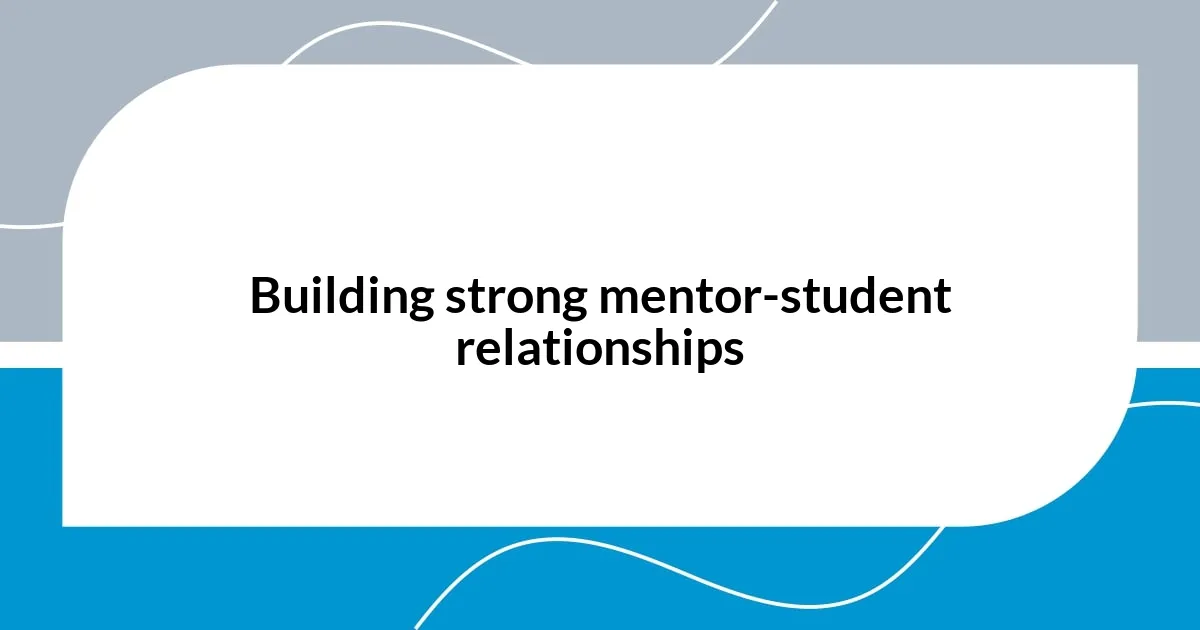
Building strong mentor-student relationships
Building a strong mentor-student relationship truly hinges on trust. I remember a time when a shy student confided in me about their anxiety regarding public speaking. That moment of vulnerability opened up a channel of communication, allowing us to work closely together and transform fear into confidence. Have you ever had a student open up to you like that?
Active listening is another cornerstone of these relationships. One day, a student shared dreams that seemed far-fetched, but their passion was infectious. Instead of dismissing their ideas, I took the time to listen and encourage them, which helped them feel valued and understood. When was the last time you really listened to a student, beyond just hearing their words?
Consistency is essential for nurturing these connections. I made it a point to check in regularly, even sending a quick message to see how they were doing. This simple act reinforced the idea that I was genuinely invested in their journey. Do you think your students feel your support consistently, or could there be room for more connection?
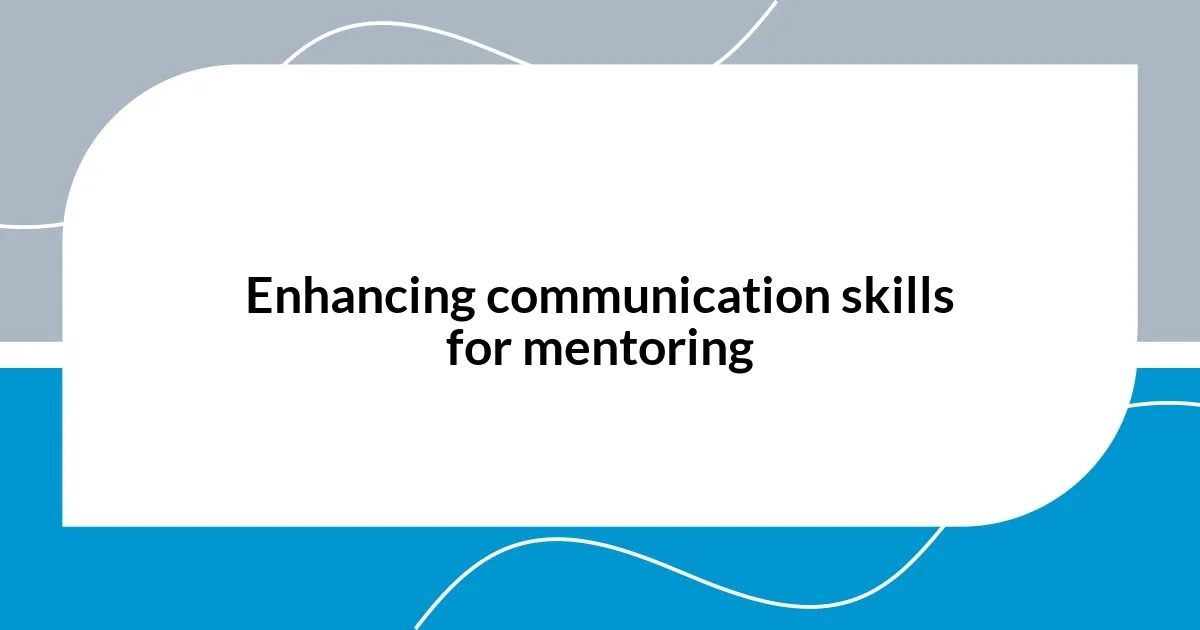
Enhancing communication skills for mentoring
Effective communication is the backbone of successful mentoring. I’ve found that clarifying my intentions early on sets a positive tone. For example, during my first meeting with a new student, I shared my mentoring philosophy and encouraged them to share their expectations. This openness fosters an environment where both of us feel comfortable expressing our needs, which is essential in any mentoring relationship.
In my experience, tailoring my communication style to suit each student makes a significant difference. I remember working with a student who was very visual; they responded better to diagrams than lengthy explanations. By adapting my approach, we bridged the gap between understanding and misunderstanding. Have you ever modified your communication method to suit someone’s learning style?
Lastly, nonverbal cues often convey more than words can express. I learned this during a session when I noticed a student’s body language shifted as we discussed a challenging topic. Recognizing their discomfort allowed me to adjust my tone and pace, making our conversation more productive. I realized that being attuned to these subtleties can deepen our connection significantly. Have you paid attention to how your students respond beyond words?
| Effective Communication | Active Listening |
|---|---|
| Sets a positive tone from the start | Encourages students to share their thoughts |
| Clarifies intentions | Validates student feelings and ideas |
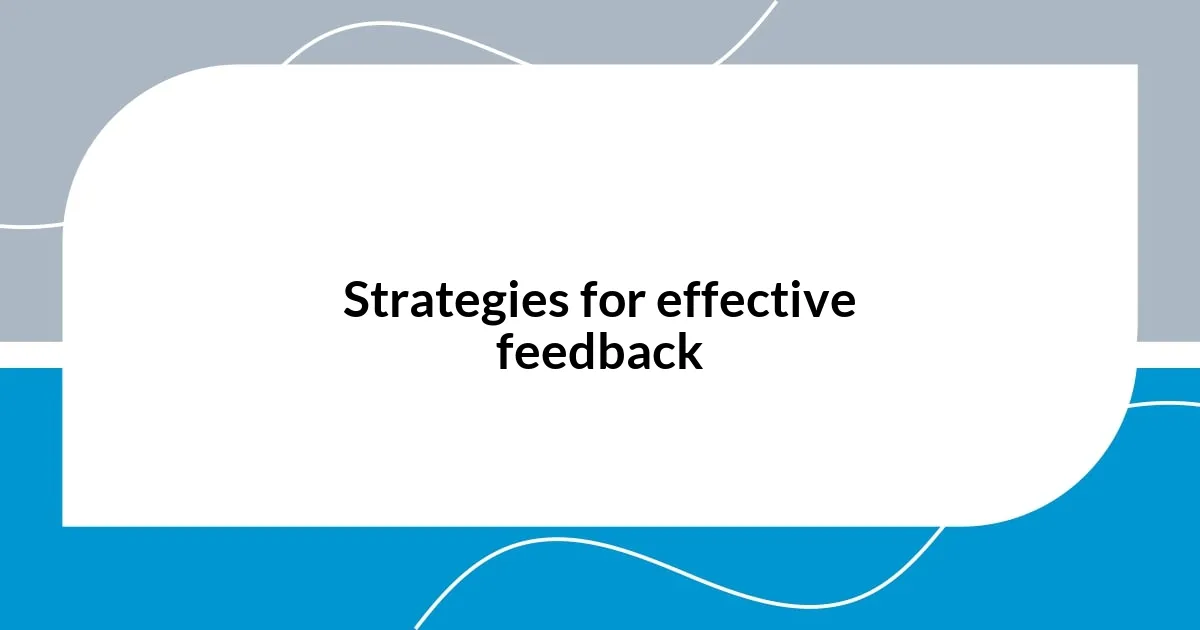
Strategies for effective feedback
When it comes to giving feedback, I’ve learned that specificity is key. I once provided feedback to a student who had submitted a research paper. Instead of just saying “good job,” I highlighted specific sections where they excelled and suggested precise areas for improvement. This targeted approach not only clarified my expectations but also empowered them to focus their efforts more effectively. I’ve seen that when feedback is clear and actionable, students feel more capable of making meaningful changes.
To make your feedback even more impactful, consider these strategies:
- Use the “sandwich” method: Start with something positive, then add constructive criticism, and end with another positive note. This softens the impact of the critique and helps students feel more encouraged.
- Be timely: Providing feedback soon after an assignment or interaction ensures that students can connect your comments to their recent experiences, making it more relevant and easier to implement.
- Encourage self-reflection: Ask students how they feel about their work. This can prompt a deeper understanding of their own strengths and weaknesses, fostering growth.
- Incorporate peer feedback: Sometimes hearing from fellow students can provide new insights and lessen any hesitance to consider critiques.
- Follow up: After giving feedback, check back in to see how they applied it and what they found helpful. This demonstrates your continued investment in their development.
By employing these strategies, I’ve recognized that effective feedback is a conversation rather than a monologue, encouraging a collaborative spirit in the learning process.
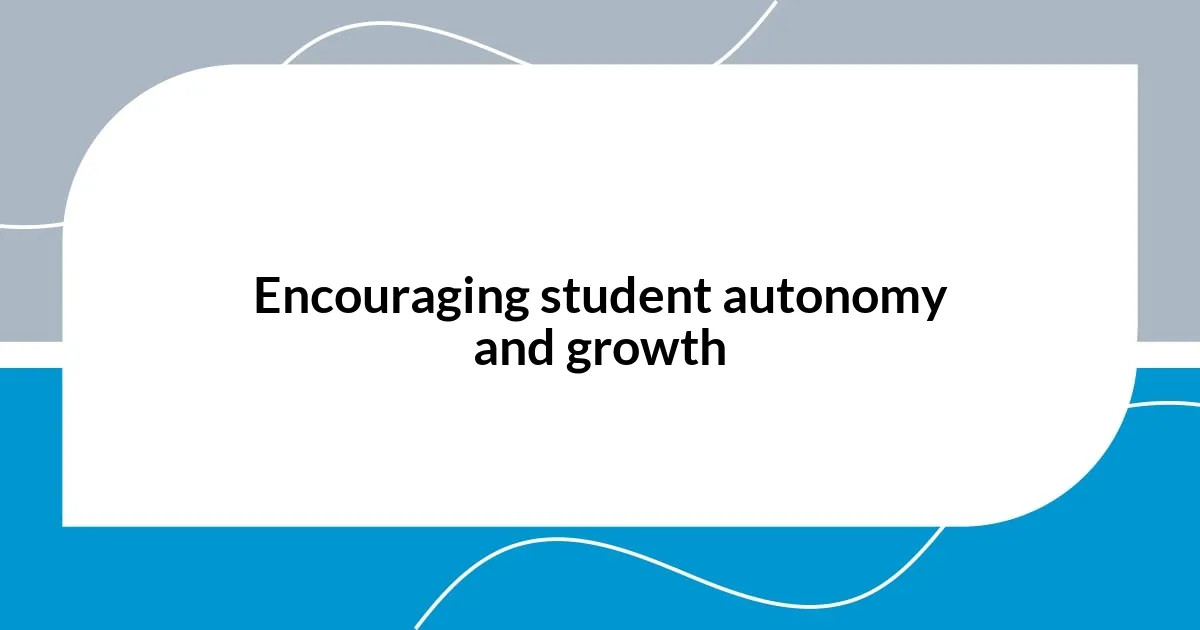
Encouraging student autonomy and growth
Encouraging student autonomy is something I’ve valued deeply during my mentoring journey. I recall a moment when a student, eager yet hesitant, approached me about exploring an independent research project. Instead of leading the way, I guided them in crafting their proposal and setting their objectives. Watching them take charge transformed our relationship; it felt like I was witnessing their confidence bloom right before my eyes. Isn’t it wonderful to see someone take ownership of their learning?
Promoting autonomy isn’t just about giving students freedom; it requires trust. I remember feeling nervous the first time I let a student decide the focus of our discussions. But by allowing that choice, I noticed they became more engaged and energetic. This shift highlighted how empowering students can spark their intrinsic motivation. Have you ever noticed how a little freedom can ignite a passion for learning?
Growth thrives in an environment where students feel safe to make mistakes. One of my students once tackled a challenging project and failed spectacularly. Instead of viewing it as a setback, we used it as a learning opportunity to analyze what went wrong. I often reflect on that incident, realizing that this mistake proved to be a crucial stepping stone in their academic journey. How often do we allow ourselves or our students to embrace failure as an important part of growth?
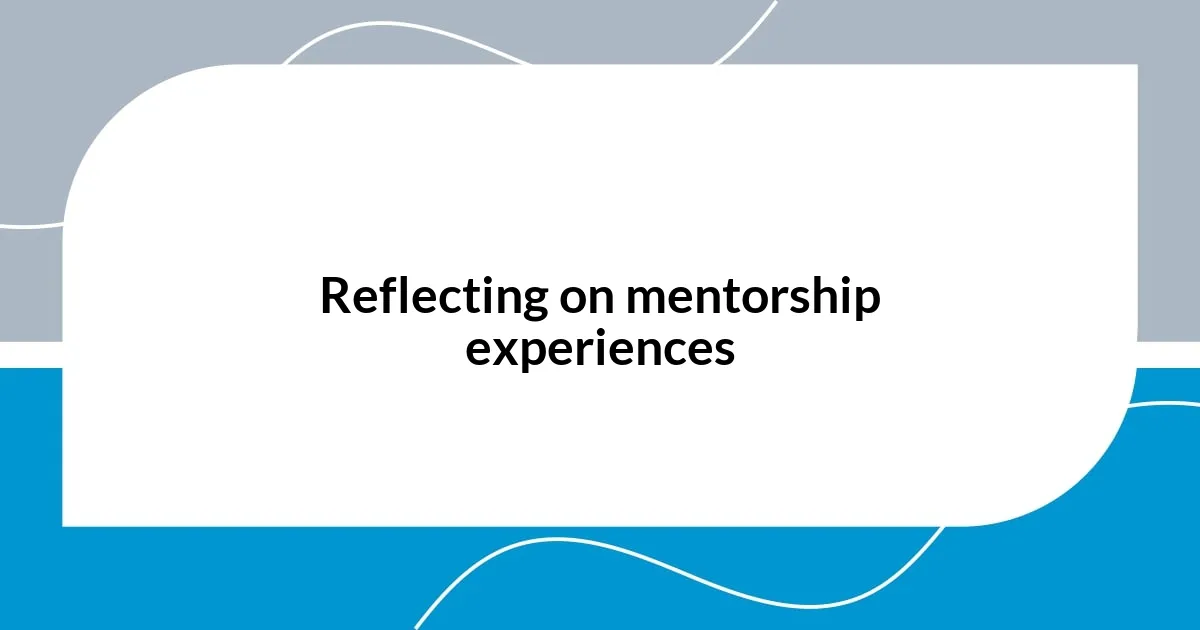
Reflecting on mentorship experiences
Reflecting on my mentorship experiences brings to light just how impactful these relationships can be. I remember sitting with a student who seemed overwhelmed by the workload. As we discussed their challenges, I realized that providing a listening ear often proved more valuable than any advice I could offer. It was a powerful reminder that sometimes, just being present can create a safe space for students to express themselves, paving the way for their own problem-solving.
I often think about the moments when students first connect with their passions. One student, who initially doubted their potential, found joy in a subject I hadn’t initially expected them to be interested in. Witnessing their transformation as they engaged with the material was truly gratifying. It makes me wonder: how many hidden talents lie dormant, waiting for the right encouragement to be unveiled?
Looking back, I’ve learned that reflection goes beyond just assessing academic performance; it involves recognizing emotional growth, too. I’ve had students come to me after difficult setbacks, sharing how our discussions helped them reinterpret their failures as stepping stones rather than roadblocks. It’s these moments of revelation, both for them and for me, that underscore the essence of mentorship. Have you ever experienced a breakthrough that reshaped your understanding of what true success looks like?
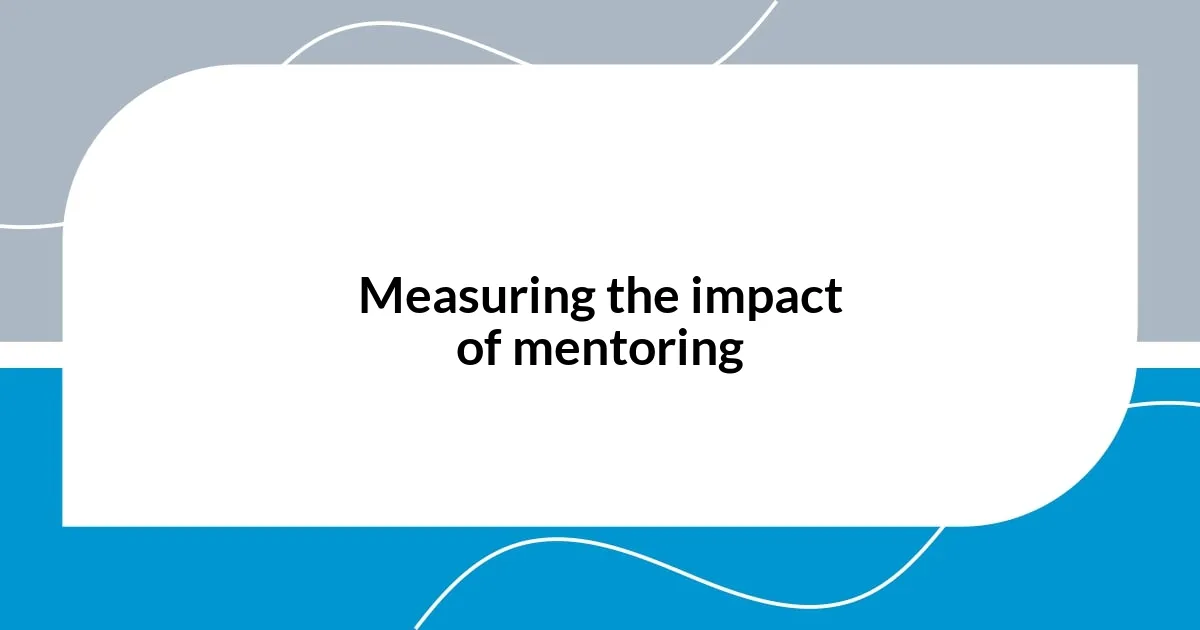
Measuring the impact of mentoring
Measuring the impact of mentoring can often feel like navigating an emotional landscape. I once had a student who struggled with anxiety, unsure of her abilities in mathematics. After weeks of mentoring sessions where we tackled problems together, I noticed her confidence start to shift. The first time she presented her solution to the class, her smile radiated joy. It was a defining moment that validated not just her progress, but the importance of our mentoring relationship. Don’t you think moments like these are what truly measure success?
In another instance, I took note of a particular student’s progress through tracking not just grades, but their participation and enthusiasm in discussions. Initially quiet and reserved, he blossomed into a lively contributor. I remember the pride I felt when he volunteered to take the lead in a group project. Seeing such growth illuminated how mentorship can profoundly affect a student’s engagement and self-perception. Isn’t it amazing how subtle changes in behavior can signal significant growth?
Quantifying impact doesn’t always involve numbers; it often emerges in the stories we share. A former student reached out years later to tell me the skills we worked on together shaped her career choices. Hearing her reflect on how our time together influenced her life path was incredibly moving. It reinforced my belief that mentorship leaves lasting impressions—ones that can weave through a person’s life journey, sometimes in unexpected ways. How do you measure the moments that truly matter?